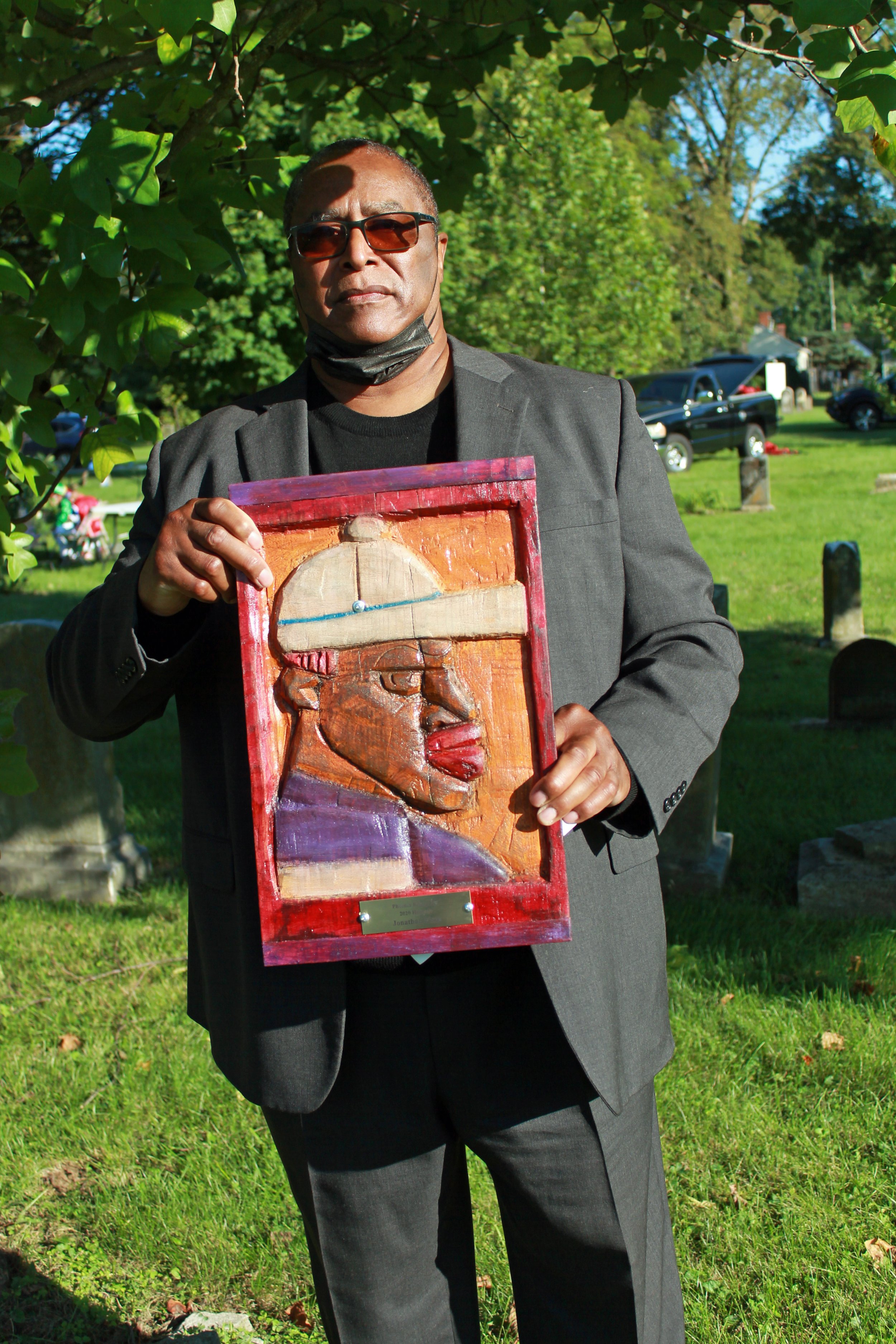Charles Robinson
Mr. Robinson began working at the age of sixteen, apprenticing with Richard ‘Dick’ Spiller, long time trainer.
As a young boy Robinson had worked with and observed his grandfather and father exercise horses. It was natural that he chose the profession. Farms on which he worked were Saxony, Maine Chance, Heaven Hill, Robbey Stables and Domino Stud.
Robinson worked horses on tracks at Florida Downs in Florida, River Downs in Ohio, Hollywood Park in California, Latonia in Northern Kentucky, Keeneland in Lexington, as well as tracks in New Jersey and New York.
He exercised the 2001 Kentucky Derby winner, Monarchos. Robinson came off the saddle in 2011.
Philip Jones (b. 1945)
Mr. Jones was born in Huntington, West Virginia and at the age of sixteen moved to Lexington to live with his grandparents. He went to work with his grandfather who was a stud groom, trainer, and manager at horse farms in Fayette County. He told Jones not to get involved with horses because it was too hard. Jones followed him anyway.
To earn money as he developed his stable, Jones drove for a trucking company and later for UPS. After forty years, he retired from trucking to devote the rest of his life to breeding Thoroughbreds. As a breeder, Jones chooses names that have special meaning such as Marshall’s Back named in honor of his grandfather. A second horse, He’s Rising, was foaled at Easter.
Jones was once given a one-eyed horse. The colt’s left eye - the rail eye - had been knocked out by accident as a foal. Jones found that the horse learned quickly and he named him I Can Still See U. While racing, the colt would turn his head as horses approached his blind side yet even so, the colt often finished. Jones felt that the colt might win if run on the inside rail and the next race he was taken to the inside and I Can Still See U won a $15,000 Maiden Claiming race at Turfway Park in 2002.
As a trainer, Jones has a proven routine for training winners. With patience and calmness, he gets the young colt or filly used to being handled and ridden. Jones has trained Thoroughbreds at Churchill Downs, Latonia Race Course and River Downs. He currently stables and trains at the Lexington Training Center.
Theophilus Irvin, Jr. (1915 - 2009) — Award accepted by Niece, Sunserria Watson
Mr. Irvin was the first African American to become a Kentucky Racing Commissioner, issuing licenses and testing horses for drug violations. He served in that post from 1979-1995.
Irvin had been working with horses since he was a boy when he worked with his horse-trainer father. In 1931, when Theophilus Jr. was 15 years old, he began breaking horses at Hickory Farm. He got his first trainer’s license in 1947 at Narragansett, RI and later trained horses for owners such as J. Graham Brown and Keene Daingerfield.
Theophilus Irvin, Jr. was the son of Ada Morton Irvin and Theophilus Irvin, Sr. The family of four lived on 511 Chestnut Street in 1920, and in 1932 at 549 Thomas Street. He was married to Olive Bell Irvin (1914-1996).
Jonathan Figgs Jr. (b. 1955)
Mr. Figgs was born in Lexington and raised in New Zion. As a young boy he always had a toy horse in his pocket. When people asked what he wanted to be when he grew up, he would tell them he wanted to be a horse. His parents advised him that was not possible. He then decided he wanted to become a jockey. His father told him that he was already too big to ride. Those facts did not keep Figgs away from horses.
Figgs learned to work with horses from his grandfather who used them for plowing his farm fields. At age thirteen, Figgs worked at Castleton Farms where he worked with his other grandfather who had worked at the farm since 1917 as a stud groom.
Figgs became well versed in grooming, breeding, breaking and training yearlings and preparing them for sales. With these skills, he found work at some of the top farms in the Bluegrass Region including: Spendthrift Farm, Hamburg Stud Farm, Gainesway Farm, Overbrook Farm, John T. Ward Farm, and Claiborne Farm.
There he worked with some of the best thoroughbreds, including many Racing Hall of Fame horses, but enjoyed working with Forego the most. Some of his proudest moments included watching the racing success of Alysheba.
Greg Harbut
Harbut’s history with horses stretches back to his great-grandfather, Will Harbut and his grandfather, Tom Harbut who were grooms, trainers and an owner.
Harbut had experience with horses, working with his family at Maddoxtown, a community in the mist of Thoroughbred stock and breeding farms. His great grandfather was Will Harbut, long time stud groom for Man o’ War and his grandfather Tom Harbut who was a groom and co-owner of a 1982 Kentucky Derby entry.
As a teen, Harbut was employed at Winstar Farm where he gained even more knowledge and honed his skills. Harbut participated in international training and management programs which prepared him for his next step in the industry.
He returned to his native Kentucky to start the Harbut Bloodstock agency. He assists owners with acquisitions of bloodstock that enhance their stable of Thoroughbreds.
In 2017 he and Ray Daniels established Living the Dream Stables, a partnership of minority owners focused on attracting African Americans into Thoroughbred ownership.





